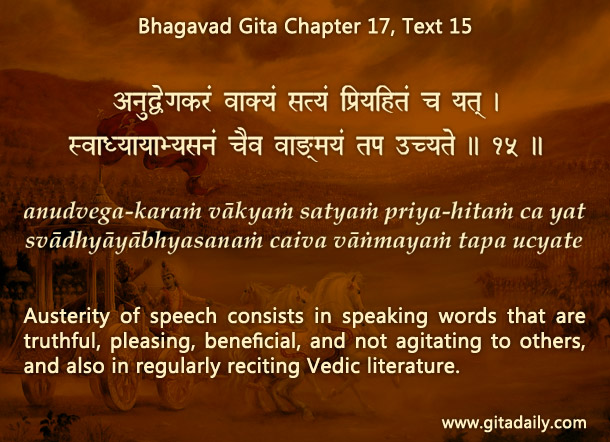When we love someone authentically, that love involves a dynamic tension between our concern for them as they are presently and our concern for what they can be potentially. Consider the love of parents for their children. Parents need to ensure two things when loving their children: that they feel accepted, valued, treasured; and that they also become disciplined, cultured, socialized. The first ensures that they are happy now, the second ensures that they will be happy in the future.
Just as the present-future tension is inherent to love, it is also inherent to speaking, especially when speaking to a loved one, for speech is an essential way of expressing love. The Bhagavad-gita (17.15) echoes this tension when stating that effective speech needs to be both pleasing (priyam) and uplifting (hitam). Pleasing speech appeals to others in their present condition; it is warm, polite, appreciative. Uplifting speech appeals to them to become better; it guides, encourages and stimulates them to do the things necessary for improving their future condition.
Overall, we can strive to speak in a way that is both pleasing and uplifting. But doing both together sometimes becomes tough because their present feelings and their future needs point in differing, even opposing directions. At such times, we need to focus more on one aspect. How can we decide what to focus on? By gauging their mood and need. If they are disheartened because of some reversal, they may need to be affirmed and encouraged; we can focus on speaking in a way that is pleasing. If they are complacent about their situation, they may need to be jolted and pushed; we can focus on speaking in a way that is uplifting.
One-sentence summary:
Speaking effectively, like loving authentically, needs to address both others’ feelings and their future, focusing more on whichever is contextually important.
Think it over:
- What is the tension inherent to love?
- How is this tension manifest in speaking?
- While speaking, how can we manage this tension?
***
17.15: Austerity of speech consists in speaking words that are truthful, pleasing, beneficial, and not agitating to others, and also in regularly reciting Vedic literature.


Thank you for this very nice, and deep, explanation!
The analogy is illuminating and helps me to understand this statement by the Lord. I had not contemplated it so deeply.
Hare Krsna.
Happy to be of service; thanks for your comment.